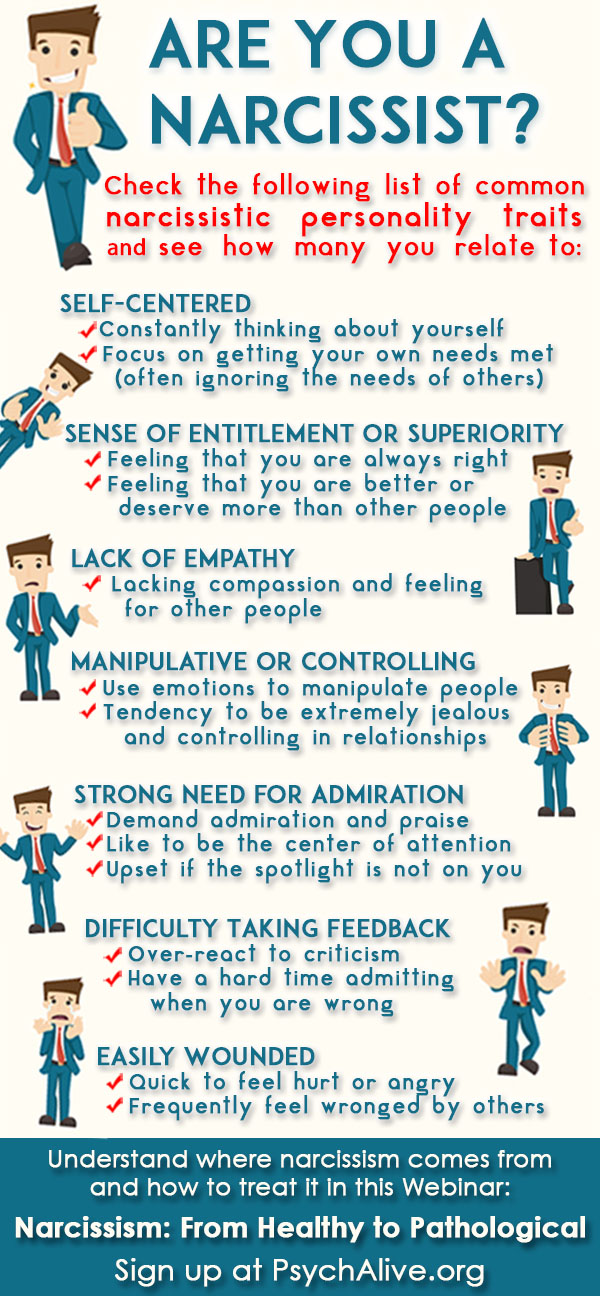Narcissism: From Healthy to Pathological

In this Webinar:
How can we distinguish healthy self-confidence from narcissism? Is there an epidemic of narcissism in our society? How can we deal with narcissists in our lives, whether they are our parents, our partners our friends or our patients? This Webinar will address these questions and provide answers that will help you understand and relate more effectively to individuals along the spectrum of narcissism, including those with Narcissistic Personality Disorders. Pathological narcissism can be expressed in temporary reactions and traits or in a stable, enduring personality disorder. Individuals with pathological narcissism experience hypersensitivity and low frustration tolerance. Their sense of self is grandiose but fragile. Their self-esteem fluctuates from self-enhanced/ grandiosity to vulnerable/ inferiority. They often use relationships to attempt to enhance their self-esteem at the expense of more equal relating, and their partners are often frustrated and dissatisfied. Therapists often find these individuals to be difficult patients to form an alliance with and treat effectively.
In this Webinar ,we will explore the developmental origins of narcissism and how it relates to healthy self-esteem. The diagnostic characteristics of Narcissistic Personality Disorder will be clarified as well as how to recognize someone with pathological narcissism. The struggles narcissists experience and the difficulties inherent in relating to them will be explored. Effective coping strategies for those dealing with narcissism will be presented as well as the forefront of effective treatments for Narcissistic Personality Disorder.
Learning Objectives:
1. Recognize the difference between healthy self-esteem and narcissism
2. Explain the developmental origins of narcissism and how it relates to healthy self esteem
3. List the diagnostic characteristics of Narcissistic Personality Disorder
4. Describe the struggles narcissists experience with fluctuating self-esteem and problems self-regulating
Ordering Information
Once payment is received, you will be emailed a full video recording of this webinar along with all presentation materials.
Optional CEs (3) may be purchased through R. Cassidy Seminars. You can earn your CEs by watching the webinar and completing an accompanying reading assignment. A link to purchase CE Credits will be included in the email containing all your webinar resources. More Info Here
Continuing Education Information
Optional CEs (3) may be purchased through R. Cassidy Seminars. You can earn your CEs by watching the webinar and completing an accompanying reading assignment. A link to purchase CE Credits will be included in the email containing all your webinar resources. More Info Here






I am interested in your webinar on Narcissism. I cannot wait to participate.
Unable to listen to live program
Please email program as promised
Dr. Firestone,
Can you recommend a book or books written by individuals in relationships dealing with NPD? Thanks and looking forward
I know that most if not all sufferers of NPD have problems beyond their control. This is born out in the fact that the same general analytical criterior fits all thus the 40 point/9 point etc. tests for NPD. This being the case there is strong arguement for them to have no or very limited control over their reactions to narcissistic injuries and thus to some degree?should not be held accountable for their actions or reactions to perceived or real narcissistic injury would you not agree?
Did u ever find an answer or an opinion to yr question?
Need Help! Can you recommend a book that will indirectly address narcissism. It isn’t exactly the easiest thing to suggest to your partner that they read a book about the topic.
Im a narcissist with a meth addiction
All true
I don’t agree although I initially did and I’ll tell you why with one simple, yet profound statement.
They can and do control who they show their real selves to. Having been in a 7 year relationship, I’ve witnessed this countless times.